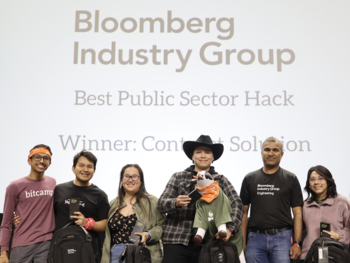In This Story
George Mason University cybersecurity and information technology students won challenges in two recent major hackathon events, one on March 25 at the University of Virginia (UVA) and another on April 7-9 at the University of Maryland (UMD).
Seniors Jhonn Cardozo and Ronald Santos Garcia and junior Maya Crosby had 24 hours at HooHacks of UVA to solve coding challenges, taking home $500 and the pride of winning the primary challenge in one of the 50 biggest hackathons in the country. Two weeks later, along with Katherine Horvath, a recent information technology graduate, they were one of two teams to win awards in two different challenges at UMD’s Bitcamp, including taking first in the Bloomberg Industry Group challenge. Both hackathons resulted in job leads for the contestants.
HooHacks, put on by a student group at UVA of the same name, comprises six levels of challenges and includes a special “Capture the Flag” element, sponsored by Fannie Mae. Cardozo said, “We experimented with the challenges, dividing them up according to our expertise. We were testing and modifying requests, eventually finding something interesting to take on.”'

The challenge took place over 24 hours, starting at noon on March 25. The Mason team, however, didn’t start hacking – or “grinding” (the standard term referencing the tedious, difficult task of finding vulnerabilities) – right away, spending several hours in workshops and sessions. “For the first six hours we went to workshops, ate, explored a bit, and then we got to work at about 6 p.m.,” said Cardozo. “We worked for four hours, then we watched a movie (Pirates of the Caribbean) and then worked from about midnight until 6 a.m.”
After being announced as winners, the team was approached by Fannie Mae staffers, who use the event to seek potential employees, who told them they were extremely impressed with their performance.
Bitcamp at UMD had five primary tracks, varying from machine learning to quantum computing, and included over 1000 students, packed into the Xfinity Center on the College Park campus. Crosby said, “The hackathon was 36 hours and the 12 extra hours were definitely appreciated. We spent the first day kind of tossing around ideas and didn't start working until the second day. Ron and I spent a good chunk of the morning working on a sponsored challenge from Fannie Mae on the famous knapsack problem (Utilize a knapsack algorithm to fill a knapsack with objects without exceeding the knapsack’s weight capacity).” Santos gave credit to a particular faculty member and class.
The Bloomberg project involved using any public/government data to showcase a specific application highlighting data insights and intelligence. The team’s solution elicited praise from Bloomberg representatives, with the sponsors noting how impressed they were with the product, and with the team being able to combine the necessary knowledge and skills to build it in a short span of time.
“I never knew that hackathons could be so mentally and physically demanding!” said Horvath. She said, “There was very little sleep, and my team decided to take on a side quest – determine exactly how much Red Bull one person can drink in one weekend.”
Team members attribute the accessibility and humility of their Mason professors as contributing to their success in the field. In addition, groups like the Cybercompetitive Club help build community, allow them to get to know fellow students better, and sharpen their skills. Cardozo said that cybersecurity majors at George Mason perhaps don’t have the same amount of hands-on skills as those at other universities, but they have great foundational knowledge to prepare them for hackathons… and their future careers.
Horvath, the recent grad, said, “Studying at Mason gave me a strong foundation in web development and I learned many of the fundamental technical skills needed to complete the challenges. I also gained valuable experience in application development through the many group projects I worked on.”
